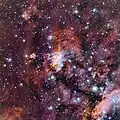| Emission nebula | |
|---|---|
| H II region | |
 Detailed view of the Prawn Nebula | |
| Observation data: J2000 epoch | |
| Right ascension | 16h 56m 54.66861s[1] |
| Declination | −40° 30′ 44.4441″[1] |
| Distance | 6,000[2] ly |
| Apparent magnitude (V) | +7.31[1] |
| Apparent dimensions (V) | 90' |
| Constellation | Scorpius |
| Physical characteristics | |
| Radius | 125[3] ly |
| Designations | HD 152723, CSI-40 10986 21, Hbg 1258, SAO 227479, ALS 3854, CSV 102812, HIC 82936, SKY# 30546, CD-40 10986, GC 22819, HIP 82936, TD1 19710, CEL 4464, GCRV 9755, IC 4628, UBV 14329, CGO 429, GEN# +1.00152723J, LS 3854, uvby98 100152723 ABC, Cl Trumpler 24 405, GOS G344.81+01.61 01, MCW 1270, CPC 0 15594, GSC 07872-02169, NSV 8060, CPD-40 7650, GUM 56, PPM 322447 |
Prawn Nebula, also known as IC 4628, is an emission nebula located in the Sagittarius Arm of the Milky Way, around 6,000 light-years from Earth in the constellation Scorpius. It forms part of the tail of the "False Comet" anchored by the bright open cluster NGC 6231.
Gallery
 The Prawn Nebula in close-up.[3]
The Prawn Nebula in close-up.[3]
References
- 1 2 3 "SIMBAD Astronomical Database". Results for IC 4628. Retrieved 2013-09-19.
- ↑ "Young Stars Cooking in the Prawn Nebula". ESO Press Release. Retrieved 20 September 2013.
- 1 2 "Cosmic Recycling". Retrieved 2 September 2015.
External links
 Media related to Prawn Nebula at Wikimedia Commons
Media related to Prawn Nebula at Wikimedia Commons
This article is issued from Wikipedia. The text is licensed under Creative Commons - Attribution - Sharealike. Additional terms may apply for the media files.